|
|
|
Sort Order |
|
|
|
Items / Page
|
|
|
|
|
|
|
| Srl | Item |
| 1 |
ID:
189952


|
|
|
| 2 |
ID:
165774
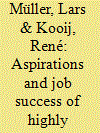

|
|
|
|
|
| Summary/Abstract |
This study pioneers the quantitative research of second generation Iranian graduates in Germany. Second generation immigrants in Germany, immigrants raised in Germany with at least one parent born abroad, are relevant as they are a crucial part of German society. Second generation immigrants in general as well as Iranians in particular are assumed to have high extrinsic aspirations. But a dataset big enough to study the employment situation of second generation Iranian graduates in Germany did not exist. Therefore, the article uses the KOAB dataset from 2011 to 2015, which contains data from 53,429 full-time employed higher education graduates in Germany (among those are 161 second generation Iranians). Their extrinsic job aspirations and career success (income, job satisfaction) are analyzed. Multivariate analyses reveal the higher extrinsic job aspirations of second generation Iranian graduates compared to many other migrant groups and Germans but similar to second generation Turkish graduates. Nevertheless, the extrinsic job aspiration is relevant, though only one factor among others to predict career success.
|
|
|
|
|
|
|
|
|
|
|
|
|
|
|
|
| 3 |
ID:
152319


|
|
|
|
|
| Summary/Abstract |
Modern military organizations are making a concerted effort to recruit a more diverse range of people, with the role of women in the military at the forefront of debate. In Australia, in response to the changing role of the military and with the aim of positioning the military as an “employer of choice” for women, females are targeted as early as high school. Using data from a study of 6,492 Australian school students in Years 3–12, we examine student aspirations for military careers. Student aspirations were influenced by traditional perceptions of the military as a primarily masculine enterprise. Key reasons for student interest included dominant notions of masculinity, familial military experience, career options, and enlistment benefits. We argue that current views of the military among school children signal the need to shift such perceptions to appeal to a wider range of people and attract a more diverse workforce.
|
|
|
|
|
|
|
|
|
|
|
|
|
|
|
|
| 4 |
ID:
169264
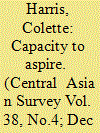

|
|
|
|
|
| Summary/Abstract |
Rather than studying young men's career- and/or economic-based aspirations, this article explores the obstacles that hinder youths of both sexes in gerontocratic southern Tajikistan and North India from developing the capacity to make their own life choices. Focusing mainly on the selection of marital partner and largely on women, I explore the narratives of those who have never even dreamed of a good life, of others who have dreamed but been unable to actualize their dreams, of a few who have started to plan the way forward, and of a tiny number who actually managed to achieve their aspirations, teasing out the influences that facilitate this. I suggest that even educated youths with some control over their public lives are constricted by their family relations and that it requires quite specific support to defy one’s family, which can create significant vulnerabilities in settings with no other safety net.
|
|
|
|
|
|
|
|
|
|
|
|
|
|
|
|
| 5 |
ID:
116732
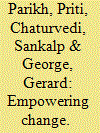

|
|
|
|
|
| Publication |
2012.
|
| Summary/Abstract |
This paper discusses the role of energy provision in influencing the social aspirations of people living in slums. We examine factors that influence the shift in aspirations in five slum settlements using data from 500 interviews conducted in serviced and non-serviced slums from the state of Gujarat in India. The non-serviced slums did not have access to basic services namely water, sanitation, energy, roads, solid waste and rainwater management. We find empirical evidence which suggests that when basic infrastructure provisions are met, slum dwellers shift their focus from lower order aspirations to the higher order aspirations like health, education, housing and land ownership. We argue that energy provision enhances productivity and enables slum dwellers to shift their aspirations upwards. Furthermore, we test the effect of work days lost due to illness on the relationship between higher order aspirations and aspirations for energy provision. When provision of energy is low, higher work day loss dampens higher order aspirations. For policy makers, this study highlights the critical link between the infrastructure services preferred by slum dwellers and their social aspirations for growth.
|
|
|
|
|
|
|
|
|
|
|
|
|
|
|
|
| 6 |
ID:
171068
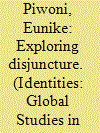

|
|
|
|
|
| Summary/Abstract |
This paper addresses current debates around elites, education and cosmopolitanism. It studies disjuncture (and interaction) between cosmopolitan practices and aspirations on the basis of 24 interviews with international students at a British elite university. Specifically, the article discusses four cases of elite students’ use of cosmopolitanism by drawing on Ann Swidler’s concepts of ‘strategies of action’ and her distinction between ‘unsettled’ and ‘settled’ lives. The case studies demonstrate that individuals, who find themselves in an unsettled phase of their life, may mobilise cosmopolitanism either to set themselves new life goals or to closely examine their lives. In settled lives, cosmopolitanism may be integrated in established strategies of action but it may also be used to (rhetorically) defend a stable orientation. This typology of four different ways of using cosmopolitanism complements previous research by exploring in depth the various forms in which ambivalences of students’ engagements with cosmopolitanism may arise.
|
|
|
|
|
|
|
|
|
|
|
|
|
|
|
|
| 7 |
ID:
160823
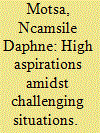

|
|
|
|
|
| Summary/Abstract |
Informed by social constructionism, this article explores the educational aspirations, fears and support mechanisms required to enhance the schooling experiences of vulnerable children in one rural school in Swaziland. It uses data from semi-structured interviews and photovoice based on a qualitative study of six vulnerable children, aged between 11 and 15 years. Vulnerable children viewed education as a vehicle for their aspired better adult life. These children held anxieties regarding anticipated lack of support to complete further education. Support mechanisms included the need for the community and teachers to assist with basic survival necessities like candles, clothing, and general parental guidance.
|
|
|
|
|
|
|
|
|
|
|
|
|
|
|
|
| 8 |
ID:
142165
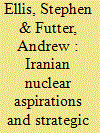

|
|
|
|
|
| Summary/Abstract |
With a few notable exceptions,1 it has become almost conventional wisdom to assume that a nuclear Iran is bad for its immediate neighbors, the wider Middle East region, and even the world.2 Such logic suggests that even an Iran with a nascent nuclear program would be emboldened in its meddling in Middle Eastern geopolitical affairs, present a serious, perhaps existential, threat to Israel and others, and could potentially lead to a nuclear-proliferation cascade among its immediate regional rivals. There is almost certainly some truth to these claims — and few people see an Iran armed with nuclear weapons as a good thing or something that should be welcomed. That said, much of the current debate has ignored or glossed over some of the other important geopolitical dynamics that have been driven by Iranian actions during the past decade: actions that have in fact been broadly positive for regional security and stability. As a result, if a comprehensive deal on the nuclear program cannot be reached by the June 30 deadline, the strategic implications of latent or even a nuclear-armed Iran may not be as catastrophic as some have suggested and more subtle than many fear.
|
|
|
|
|
|
|
|
|
|
|
|
|
|
|
|
| 9 |
ID:
143104
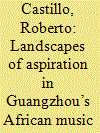

|
|
|
|
|
| Summary/Abstract |
This article is an exploration into the personal aspirations that converge in Guangzhou’s African music scene. I argue that despite being often traversed, articulated, fuelled, and constrained by economies and economic discourses, aspirations are not necessarily economic or rational calculations. I contend that the overarching trading narrative about “Africans in Guangzhou” has left little space for issues of agency, emotion, and aspiration to be considered in their own right. Drawing on a year of continuous ethnographic fieldwork, I show how aspirations are crucial arenas where the rationales behind transnational mobility are developed, reproduced, and transmitted. Indeed, aspirations can be thought of as “navigational devices” (Appadurai 2004) that help certain individuals reach for their dreams. By bringing the analysis of aspirations to the fore, I intend to provide a more complex and nuanced landscape of the multiple rationales behind African presence in Southern China; promote a better understanding (both conceptually and empirically) of how individuals navigate their social spaces and guide their transnational journeys; and draw attention to the incessant frictions and negotiations between individual aspirations while on the move and the constraints imposed by more structural imperatives.
|
|
|
|
|
|
|
|
|
|
|
|
|
|
|
|
| 10 |
ID:
092530
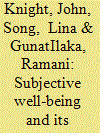

|
|
|
|
|
| Publication |
2009.
|
| Summary/Abstract |
A national household survey for 2002, containing a specially designed module on subjective well-being, is used to estimate pioneering happiness functions in rural China. The variables that are predicted by economic theory to be important for happiness prove to be relatively unimportant. Our analysis suggests that we need to draw on psychology and sociology if we are to understand. Rural China is not a hotbed of dissatisfaction with life, possibly because most people are found to confine their reference groups to the village. Relative income within the village and relative income over time, both in the past and expected in the future, are shown to be important for current happiness, whereas current income is less so. Even amidst the poverty of rural China, attitudes, social comparisons and aspirations influence subjective well-being. The implications of the findings for the future and for policy are considered.
|
|
|
|
|
|
|
|
|
|
|
|
|
|
|
|
| 11 |
ID:
147877
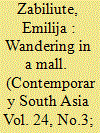

|
|
|
|
|
| Summary/Abstract |
In post-reform India, urban spaces have been redefined and reoriented towards the consumer public and are becoming increasingly segregated along class lines. While most of the scholarly attention has focused on the marginalization and segregation generated by anti-poor development in cities like Delhi, which aim to be ‘world-class’, less attention has been paid to the ways in which the poor experience the city and its middle-class consumer-oriented localities. In this article, I explore the ways in which urban poor young men who live in a squatter settlement on the fringes of the city aspire to social mobility as they wander in Delhi’s middle-class consumer-oriented spaces. Wandering (ghūmnā) is evaluated differently by young men and their parents, pointing to generational and gendered distinctions. For young men, such wandering is a means to participate in the consumer culture, while their families evaluate it as a waste of time and useless (bekār) behaviour. By placing aspirations in a temporal perspective, I show how the young men adjust their aspirations relationally, as they take up new roles as carers of their families.
|
|
|
|
|
|
|
|
|
|
|
|
|
|
|
|
|
|
|
|
|